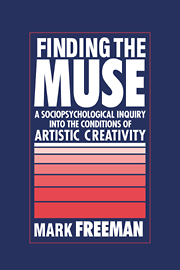Book contents
- Frontmatter
- Contents
- Acknowledgments
- Chapter 1 SOCIAL REALITY AND THE SPACE OF CREATIVITY
- Chapter 2 TO BE AN ARTIST
- Chapter 3 IN THE COMPANY OF OTHERS
- Chapter 4 CREATIVITY AND THE MARKET
- Chapter 5 THE DREAM OF ARTISTIC FREEDOM
- Chapter 6 THE CONDITIONS OF CREATIVITY
- Appendix: The Artists Project
- References
- Index
Chapter 2 - TO BE AN ARTIST
Published online by Cambridge University Press: 04 December 2009
- Frontmatter
- Contents
- Acknowledgments
- Chapter 1 SOCIAL REALITY AND THE SPACE OF CREATIVITY
- Chapter 2 TO BE AN ARTIST
- Chapter 3 IN THE COMPANY OF OTHERS
- Chapter 4 CREATIVITY AND THE MARKET
- Chapter 5 THE DREAM OF ARTISTIC FREEDOM
- Chapter 6 THE CONDITIONS OF CREATIVITY
- Appendix: The Artists Project
- References
- Index
Summary
THE (AL)LURE OF THE IMAGE
“THE WORLD OF ART,” says a flyer for the magazine ARTnews, “has never been more fascinating, more rewarding, more fun.” What should we call this new fascination? “A cultural renaissance? The latest showbiz extravaganza? A sign of the times? Whatever you call it, something new and important is happening in America today.” The evidence is as straightforward as can be: “Go to any major art opening these days, and you're likely to rub shoulders with more celebrities than at most Broadway or Hollywood premieres!” Or, if you wish, “Join the auction sale of a new Jasper Johns painting, or a De Kooning, and watch the bidding go up, up and up – past the million dollar mark!” Or, a bit more subtly, “simply follow the Saturday crowds to a popular art gallery and feel the electric excitement that fills the air!” Okay, I'll subscribe! “Yes,” the flyer continues, “it's true. The art world, once the special preserve of a fortunate few, has now exploded into the mainstream of American life. It's a cover story for Time or Newsweek. A hot topic for the TV talk shows. A new leisure time activity for millions of Americans.” It is, in short, “One of the most extraordinary cultural phenomena of our times.” It is indeed.
The mystique of the artist, frequently manifested in the form of either grandeur or alienation, has had currency for many years. In part, Marx and Engels (1981) have suggested, this may be a function of the channeling of creativity into individual persons: “The exclusive concentration of artistic talent in particular individuals and its suppression in the broad masses which is bound up with this is a consequence of the division of labor” (p. 109).
- Type
- Chapter
- Information
- Finding the MuseA Sociopsychological Inquiry into the Conditions of Artistic Creativity, pp. 36 - 85Publisher: Cambridge University PressPrint publication year: 1994



